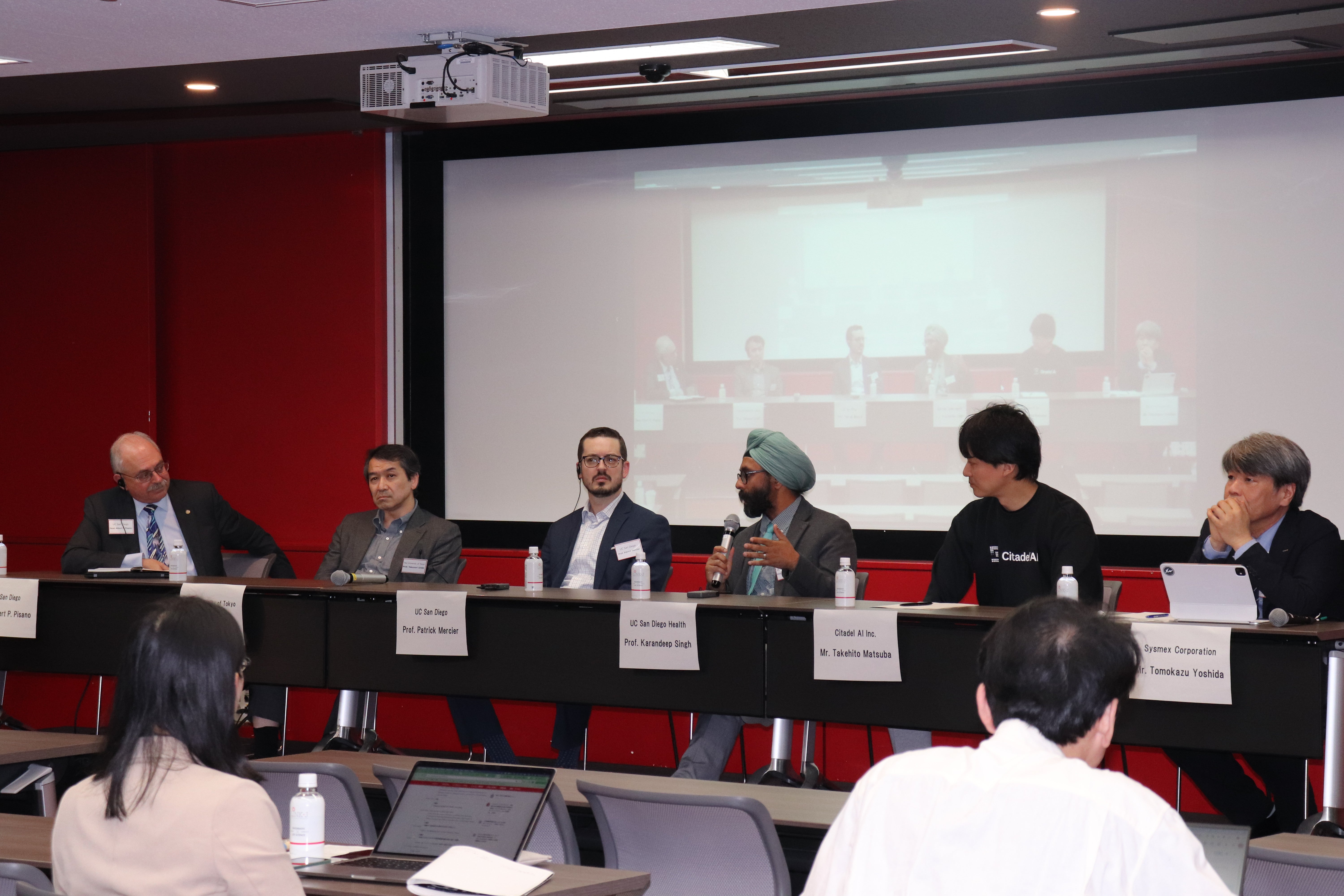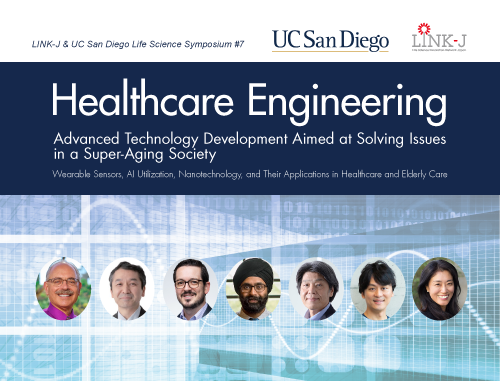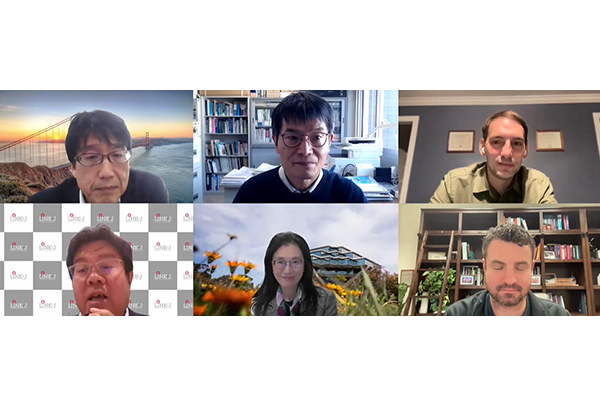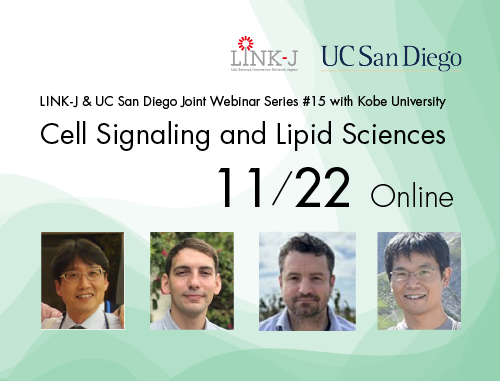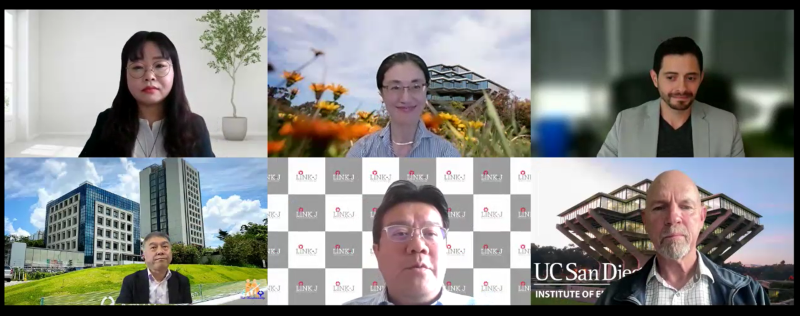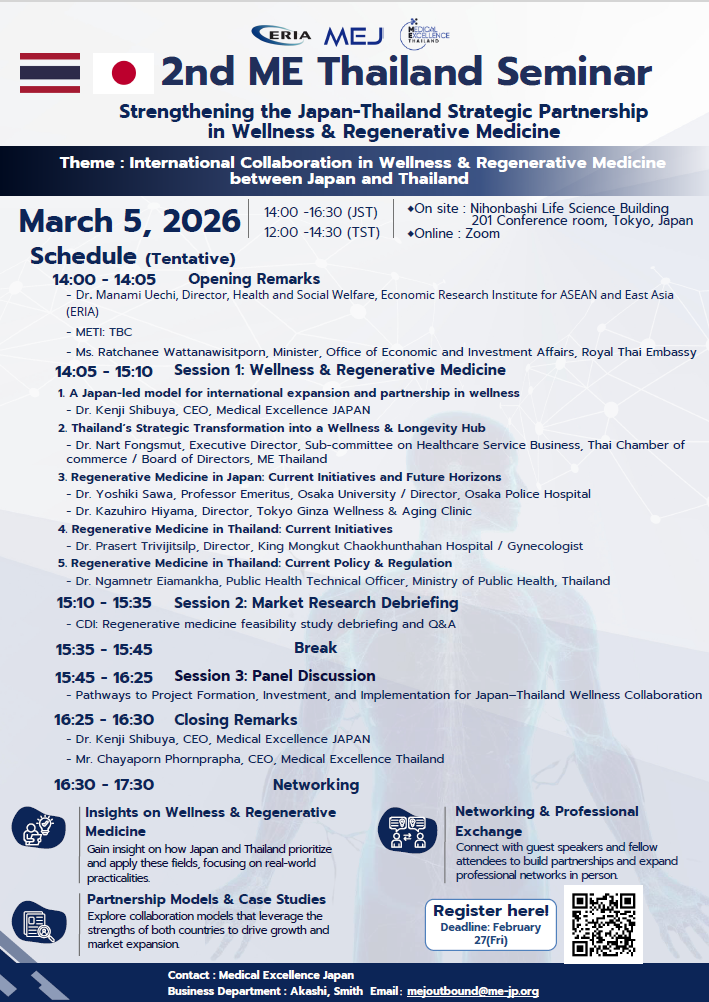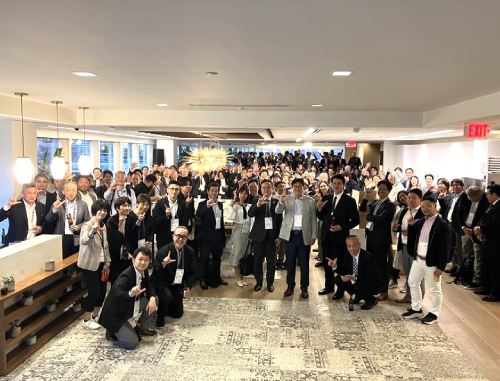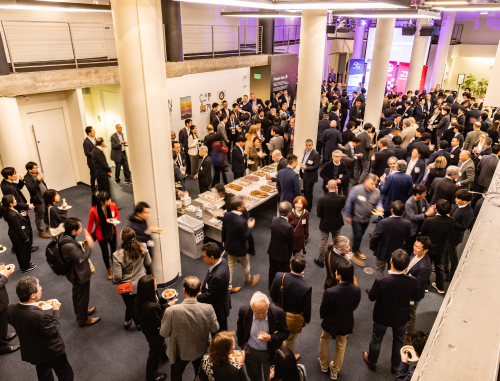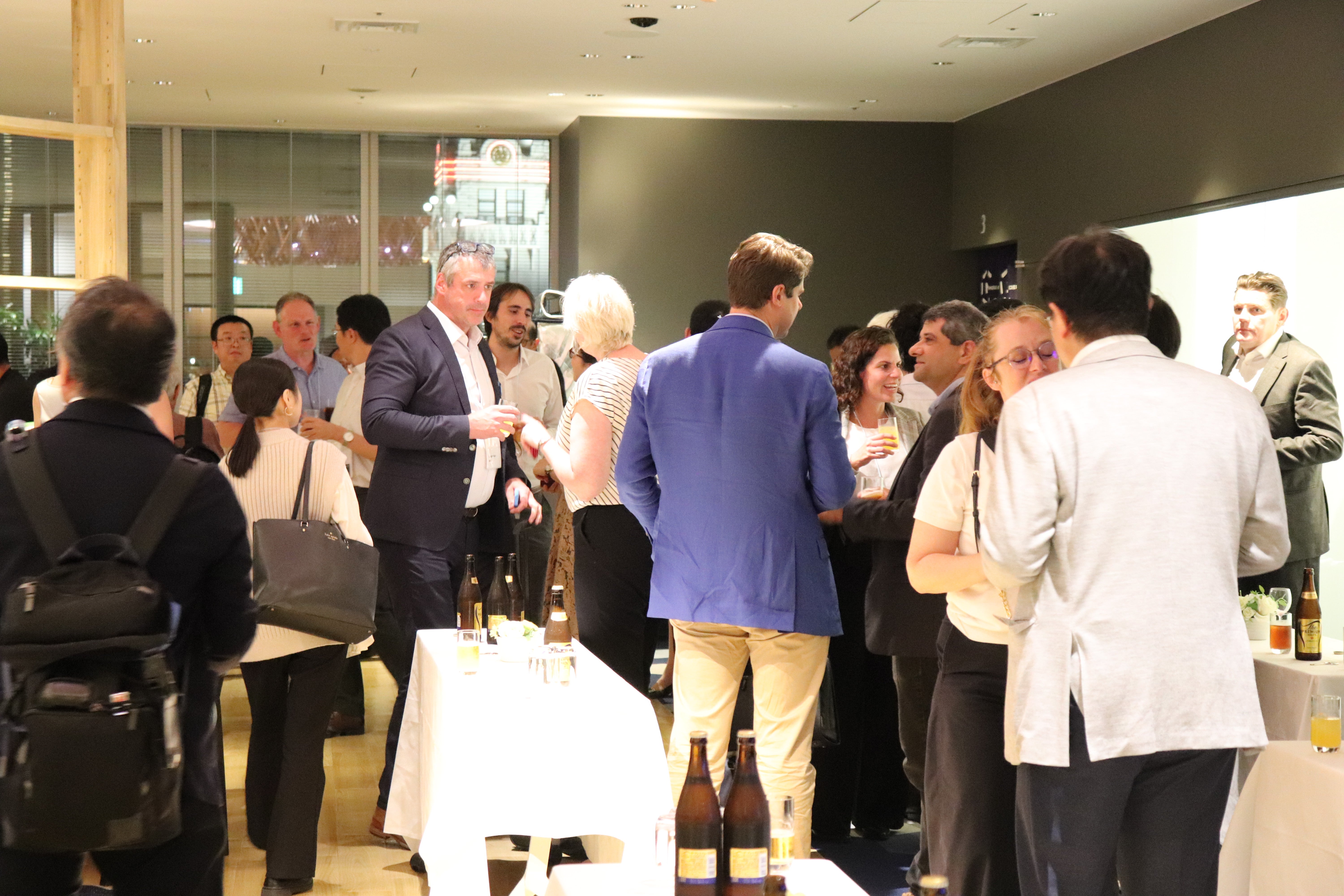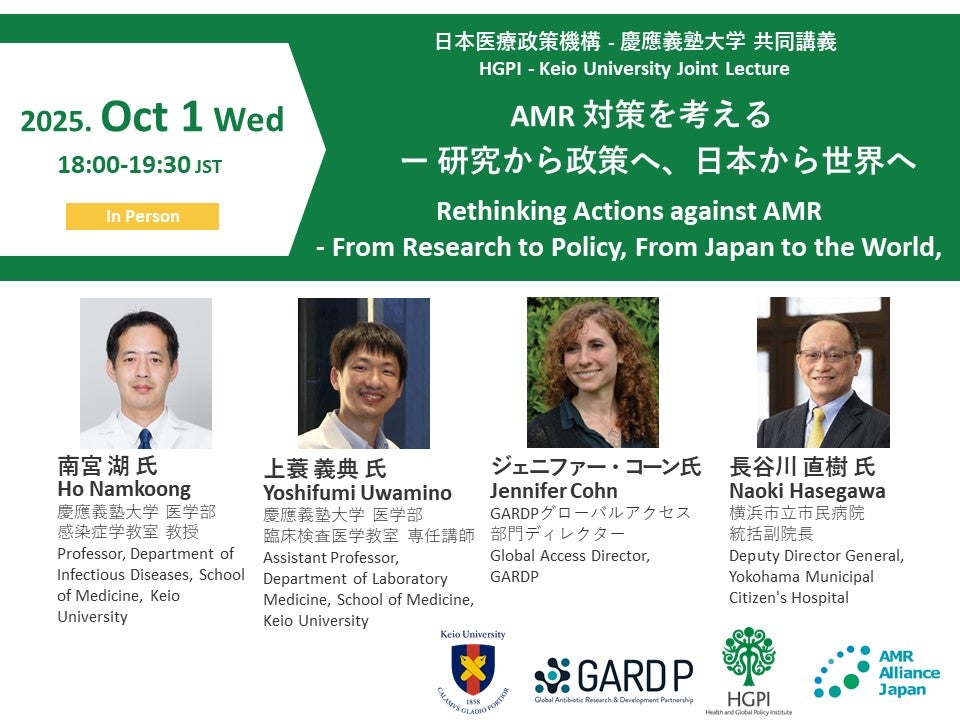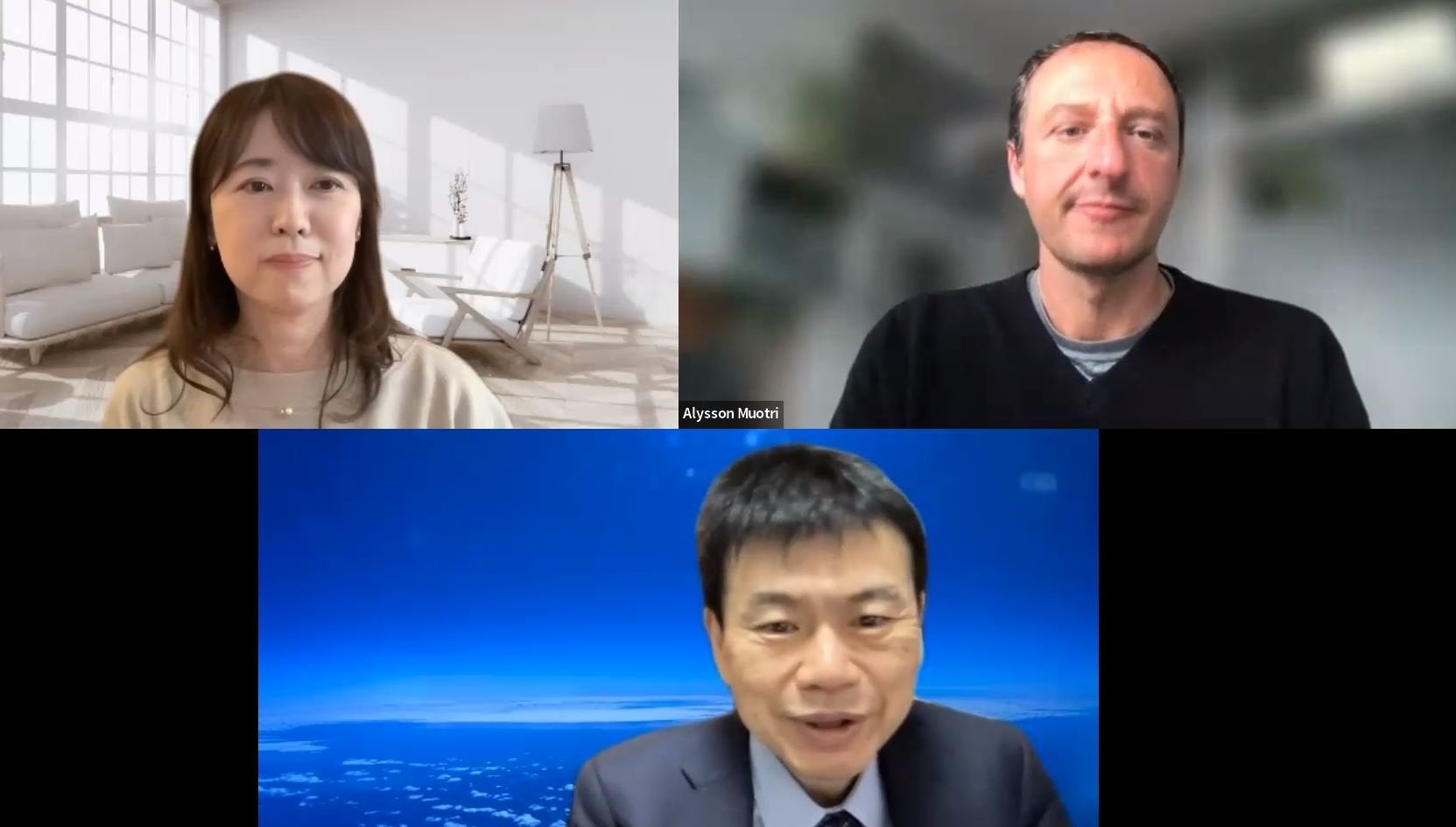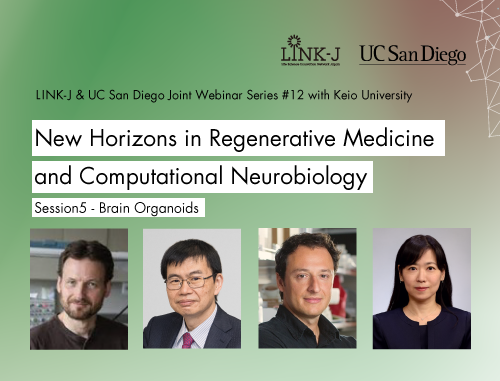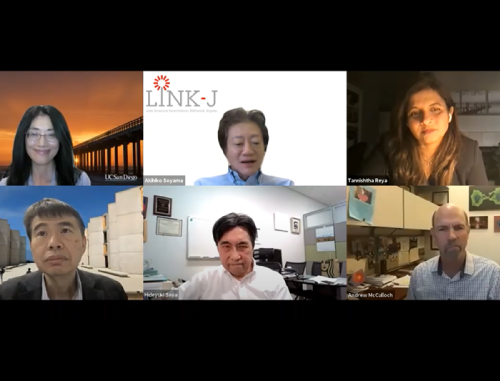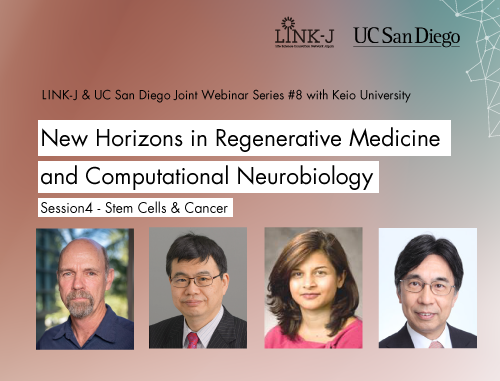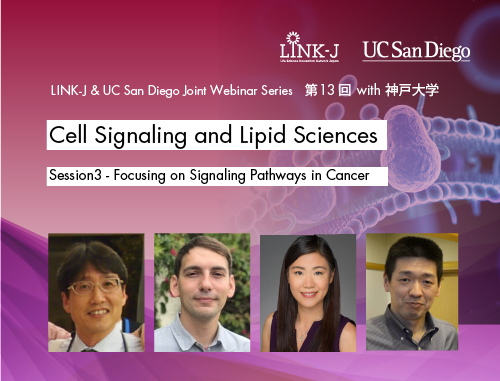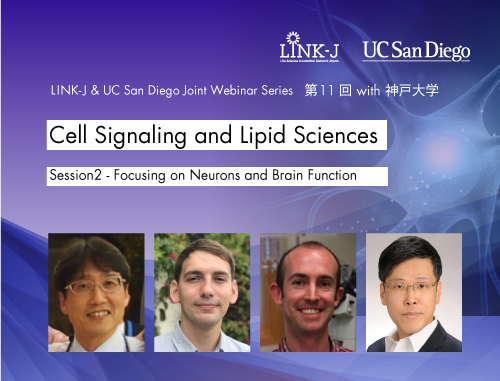UC San Diego and LINK-J have co-hosted a series of seminars inviting top UCSD researchers to Japan every year.
This year, instead, we will be holding a series of joint webinars with top researchers from both UCSD and Japanese universities.
The second in a series of joint webinars, we will invite Professor Andrew McCulloch from UCSD and Professor Hideyuki Okano from Keio University as moderators to discuss the latest trends in regenerative medicine and computational neurobiology. (Session1: Regenerative Medicine/ Session2: Computational Neurobiology)
In this Session 2, Prof. Terrence Sejnowski from UC San Diego and Prof. Yasue Mitsukura from Keio University will introduce the latest prospects in the field of computational neurobiology.
*Language:English (English-Japanese simultaneous interpretation available)
*English captions are available (you can choose to turn them on or off).
*Please note that LINK-J and UC San Diego are not responsible for any errors or omissions in the captions.
How to use captions: Managing and viewing closed captioning
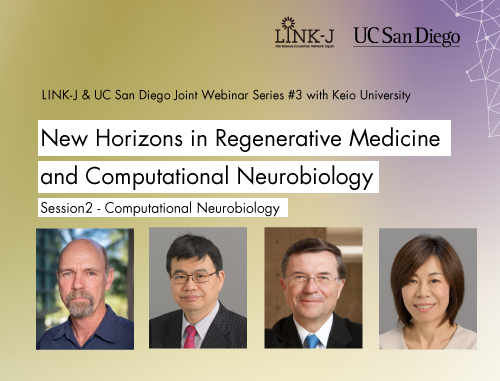
Date: Fri, Jan 29, 2021 10:00am-11:00am (JST)/ Thurs, Jan 28, 2021 5:00pm-6:00pm (PST) *The end time may be extended by 10-15 minutes.
Online (Zoom Webinar)
(Opens an external site)
Registration Fee
Free
Click ”Registration” to open an external site, and click “GET TICKET” on the right bar to sign up for the webinar.
How to participate
This event will be broadcasted on Zoom webinar. Please make a registration by one of the following ways in advance.
●Registration through peatix
https://ucsd-joint0129.peatix.com?utm_source=HP
●Registration through Zoom Registration
https://us02web.zoom.us/webinar/register/WN_9WWZhuDvSvOuxbyqw1wbTA
You will receive an E-mail titled "LINK-J & UC San Diego Joint Webinar Series #3 with Keio Univ. -Session2 Confirmation" from "no-reply@zoom.us" right after registration.
You can access the webinar through the link in the E-mail.
Program
| Japan time | U.S. time (PST) | Agenda |
| 10:00-10:05am | 5:00-5:05pm | Welcome – Aki Soyama, LINK-J and Miwako Waga, UC San Diego |
| 10:05-10:25 | 5:05-5:25 | Presentation – "How memories are consolidated while you sleep" Dr. Terrence Sejnowski, Professor and Laboratory Head, Computational Neurobiology Laboratory, Francis Crick Chair, Salk Institute for Biological Studies; Distinguished Professor of Biological Sciences, UC San Diego |
| 10:25-10:45 | 5:25-5:45 | Presentation – "Real time KANSEI and Stress Extraction only using Frontal EEG" Dr. Yasue Mitsukura, Professor, Department of System Design Engineering, Faculty of Science and Technology, Keio University |
| 10:45-10:55 | 5:45-5:55 | Q&A and Discussion - moderated by Drs. Okano and McCulloch |
| 10:55-11:00 | 5:55-6:00 | Closing Remarks – (Drs. Okano & McCulloch) and announcement of plans for quarterly joint webinars (A. Soyama & M. Waga) |
Abstract of Dr.Sejnowski's presentation
Your brain is active during sleep as it cycles between deep, slow wave sleep and rapid eye movement (REM), or dream sleep.
Evidence is accumulating that messages between the hippocampus and the cortex during these sleep stages sets the stage for the consolidation of long-term memory.
Recordings from human cortex have revealed dynamical patterns of electrical that may instrumental in triggering mechanisms for synaptic plasticity during nonREM sleep.
Abstract of Dr. Yasue Mitsukura's presentation
We proposed a method to quantify “KANSEI" by acquiring EEG, performing noise removal, analyzing data, and making mathematical model (system identification).
KANSEI is Japanese word because studied at first in Japan. KANSEI is simliar to Emotion but different. Emotion is innate ability but KANSEI is acquired after birth along with lifestyle.
Although many noises appear on the EEG, we also propose a method to remove them in real time. In addition to KANSEI, we also define stress using EEG.
It is very difficult to define KANSEI and stress using EEG, but we successfully defined it using 17 years worth of data while associating them with hormones.
Biography
Moderators
 Dr. Andrew McCulloch, Distinguished Professor of Bioengineering and Medicine; Director, Institute of Engineering in Medicine, UC San Diego
Dr. Andrew McCulloch, Distinguished Professor of Bioengineering and Medicine; Director, Institute of Engineering in Medicine, UC San Diego
Dr. Andrew McCulloch is Distinguished Professor of Bioengineering and Medicine at the University of California San Diego and Director of the Institute for Engineering in Medicine. He earned his bachelor (1981) and Ph.D. (1986) degrees in Engineering Science at the University of Auckland and joined the UC San Diego faculty in 1987. He directs the UCSD Interfaces Graduate Training Program and the Interdisciplinary Ph.D. Specialization in Multi-Scale Biology. Dr. McCulloch served as Vice Chair of the Bioengineering Department from 2002 to 2005 and Chair from 2005 to 2008. He is also a member of Qualcomm Institute, the Center for Research on Biological Systems, and a Senior Fellow of the San Diego Supercomputer Center.
 Dr. Hideyuki Okano, Dean, Graduate School of Medicine, Keio University
Dr. Hideyuki Okano, Dean, Graduate School of Medicine, Keio University
[Education]
1988: Ph.D. (Dr. of Medical Science), Keio University
1983: M.D. Keio University School of Medicine
[Employment]
2017~ Present: Dean, Keio University Graduate School of Medicine. 2015~2017: Dean, Keio University School of Medicine.
2017~Present: Visiting Professor, Peking University, China. 2009~Present: Visiting Professor, University of New South Wales, Australia.
2008~Present: Honorary Professor, the Queenland Brain Institute, Australia.
2007~ 2015: Dean, Keio University Graduate School of Medicine.
2001~Present: Professor, Department of Physiology, Keio University School of Medicine.
1997-2001: Professor, Department of Neuroscience, Osaka University Graduate School of Medicine
1994-1997: Professor, Department of Molecular Neurobiology, Institute of Basic Medical Sciences, University of Tsukuba.
1992-1994: Instructor, Department of Molecular Neurobiology, Institute of Medical Science, University of Tokyo.
1989-1993: Postdoctoral Research Fellow, Department of Biological Chemistry, The Johns Hopkins University School of Medicine.
1985-1989: Instructor, Institute for Protein Research, Osaka University.
1983-1985: Instructor, Department of Physiology, Keio University School of Medicine.
Speakers
 Dr. Terrence Sejnowski, Professor and Laboratory Head, Computational Neurobiology Laboratory, Francis Crick Chair, Salk Institute for Biological Studies; Distinguished Professor of Biological Sciences, UC San Diego
Dr. Terrence Sejnowski, Professor and Laboratory Head, Computational Neurobiology Laboratory, Francis Crick Chair, Salk Institute for Biological Studies; Distinguished Professor of Biological Sciences, UC San Diego
Terrence Sejnowski is a pioneer in computational neuroscience and his goal is to understand the principles that link brain to behavior. His laboratory uses both experimental and modeling techniques to study the biophysical properties of synapses and neurons and the population dynamics of large networks of neurons. New computational models and new analytical tools have been developed to understand how the brain represents the world and how new representations are formed through learning algorithms for changing the synaptic strengths of connections between neurons. He has published over 300 scientific papers and 12 books, including The Computational Brain, with Patricia Churchland.
He received his PhD in physics from Princeton University and was a postdoctoral fellow at Harvard Medical School. He was on the faculty at the Johns Hopkins University and he now holds the Francis Crick Chair at The Salk Institute for Biological Studies and is also a Professor of Biology at the University of California, San Diego, where he is co-director of the Institute for Neural Computation and co-director of the NSF Temporal Dynamics of Learning Center. He is the President of the Neural Information Processing Systems (NIPS) Foundation, which organizes an annual conference attended by over 1000 researchers in machine learning and neural computation and is the founding editor-in-chief of Neural Computation published by the MIT Press.
An investigator with the Howard Hughes Medical Institute, he is also a Fellow of the American Association for the Advancement of Science and a Fellow of the Institute of Electrical and Electronics Engineers. He has received many honors, including the NSF Young Investigators Award, the Wright Prize for interdisciplinary research from the Harvey Mudd College, the Neural Network Pioneer Award from the Institute of Electrical and Electronics Engineers and the Hebb Prize from the International Neural Network Society. He was elected to the Institute of Medicine in 2008, to the National Academy of Sciences in 2010, and to the National Academy of Engineering in 2011. He is one of only 10 living persons to be a member of all 3 national academies.
 Dr. Yasue Mitsukura, Professor, Department of System Design Engineering, Faculty of Science and Technology, Keio University
Dr. Yasue Mitsukura, Professor, Department of System Design Engineering, Faculty of Science and Technology, Keio University
Yasue MITSUKURA received the D.E. and Medical Doctor degree from the University of Tokushima and KEIO University, respectively. She worked at the University of Tokushima and Okayama University asan Assistant Professor and a Lecturer, respectively. From 2005 to 2010, she was an Associate Professor at Tokyo University of Agriculture and Technology. Since 2011, she is an Associate Professor at Keio University. Now She is Professor in Keio University. Her research interests are signal processing, EEG analysis, and image processing.
Upcoming joint webinar series
| Dates & Times [Japan] | Dates & Times [U.S. (PST)] | Themes |
| Feb 5, 2021 10:00-11:00am | Feb 4, 2021 5:00-6:00pm | LINK-J & UC San Diego Joint Webinar Series#4 with Osaka Univ. “Mechano-Driven Functionalization of Engineered Tissues” Session1 - Mechanobiology and Cell Matrix Interactions |
| Feb 10, 2021 10:00-11:00am | Feb 9, 2021 5:00-6:00pm | LINK-J & UC San Diego Joint Webinar Series#5 with Osaka Univ. “Mechano-Driven Functionalization of Engineered Tissues” Session2 - Biofabrication |
※The program is subject to change. LINK-J will announce details on this website.
Participation Fee
無料(要事前登録)
Organizer
Host:LINK-J, Co-Host:UC San Diego
Contact
Email:contact@link-j.org
